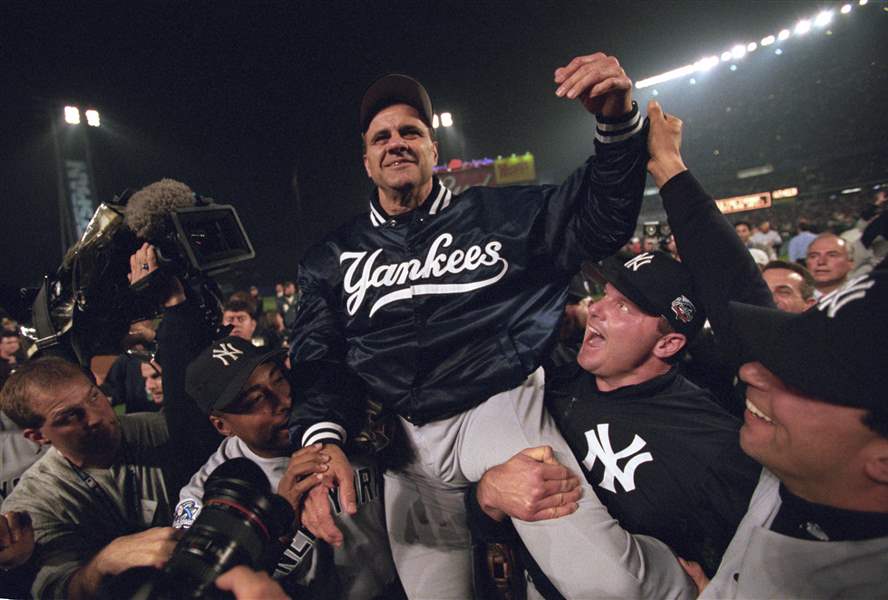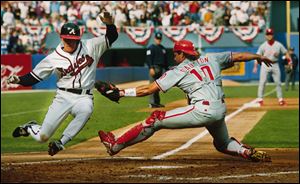
'Tenth Inning' a worthy update to Ken Burns' 'Baseball'
10/6/2010
New York Yankees manager Joe Torre gets carried off the field after winning against the New York Mets in 2000.

Philadelphia Phillies catcher Darren Daulton tries to tag the Atlanta Braves' Jeff Blauser during the 1993 National League Championship Series.
Baseball always has reflected the culture and society in which it exists, for better and for worse. As documentary filmmakers Ken Burns and Lynn Novick showed in Baseball, their wonderful nine-part PBS series from 1994, our national pastime has had its cyclical dark sides and positive eras.
The cheating and gambling that was so prevalent in the early decades of the 20th century led to a "fixed" World Series in 1919, but also was followed quickly by the emergence of Babe Ruth as a national sports hero. While racial segregation shamefully kept African Americans out of the Major Leagues from the 1880s through 1947, the game's integration helped push the wider American society to end legal discrimination, leading to baseball's "golden age" of the 1950s and '60s. Burns and Novick ended their series on a note of optimism, as baseball appeared to be entering a new era of unparalleled performance and popularity.

New York Yankees manager Joe Torre gets carried off the field after winning against the New York Mets in 2000.
Now Burns and Novick, plus co-writer/co-producer David McMahon, have brought the story of baseball up to 2009 in their two-part documentary The Tenth Inning. After airing over two nights on PBS stations last week, the four-hour series comes to DVD and Blu-ray this week (two discs, PBS Home Video/Paramount Home Entertainment, $24.99/$29.99 Blu-ray, not rated). A new, complete 11-disc set of Baseball, including The Tenth Inning, is also available for $99.99.
There's a lot of ground to cover in these years, and the filmmakers haven't lost their touch. In rapid (but not too quick) succession, The Tenth Inning examines the strike/lockout of 1994, which resulted in the premature end of that season and the cancellation of the World Series (something World Wars I and II failed to do); the continuing rise of international players - not just from Latin America, but from the Pacific Rim as well; the expansion of the playoff system, giving many more teams the chance to win a World Series; the construction of new, more intimate ballparks in many cities; the impact of 9/11; the creation of new baseball statistics to better evaluate players' ability; and the rise and (hopefully) fall of the steroid era, which coincided with an unparalleled surge in power-hitting.
As before, the best teams and players receive the most attention. Burns admits in a DVD interview that he made this additional film to celebrate his favorite team, the Boston Red Sox, finally ending the New York Yankees' dominance in 2004. While there is a lot here about the Red Sox, the team's tortured history and its historic ballpark, Fenway Park, The Tenth Inning dutifully records the resurgence of the Yankees under Joe Torre's leadership in the late 1990s and early 2000s, the National League dominance of the Atlanta Braves and other championship teams of note. The achievements of such great players as Cal Ripken, Jr., Greg Maddux, Pedro Martinez, and Ichiro Suzuki are detailed (Martinez and Suzuki are among those featured in onscreen interviews), along with the memorable, record-setting assaults on Roger Maris and Henry Aaron's home run records by Mark McGwire, Sammy Sosa, and, later, Barry Bonds.
Without blinders but with an understanding of how Americans as a whole have become reliant on various products to enhance our appearances and libidos, The Tenth Inning incisively confronts the effect on baseball of many of the games' best players using performance enhancing drugs. Indeed, the recounting of great players who have been implicated in this type of cheating - from McGwire, Sosa and Bonds to Roger Clemens, Alex Rodriguez and Manny Ramirez - reminds us how commonplace it became. Yet the long historical perspective of Burns and company also shows how this form of cheating relates to the "thrown games" and illegal pitches (especially the spitball) of older times, as well as the use of amphetamines and cocaine by players in the 1970s and '80s.
As in the original series - and in Burns' historical documentaries in general - the filmmakers combine vintage photographs and film footage with interviews of former players, baseball officials and knowledgeable journalists. Where the original series introduced some very entertaining commentators on baseball - especially Buck O'Neil, a former Negro League player and manager and the first African-American coach in the major leagues, historian Doris Kearns Goodwin and writer Steve Early - The Tenth Inning brings in some new, engaging voices, including sportswriters Howard Bryant and Tom Verducci. Sacramento Bee columnist Marcos Breton may be the most valuable new addition to the series, as he provides expert and moving comments on several of the key issues of this era. These include the expanding role of Latin American ballplayers in the majors, the widespread use of steroids and human growth hormones by players (and the belated effort by the players' union and baseball officials to eliminate them), and the spectacular and controversial career of the San Francisco Giants' Barry Bonds.
The DVD and Blu-ray editions of The Tenth Inning deliver even more worthwhile material than what was shown on PBS. In addition to the aforementioned interview with Burns (and Novick), bonus features include deleted scenes about Dodger Town (the spring training home of the Los Angeles Dodgers in Vero Beach, Fla.), two homages to the Red Sox's Fenway Park, footage of kids playing baseball in New York's Central Park and some expanded material and interviews about baseball in the Dominican Republic.
The discs also provide outtakes - some of which are quite revealing and informative - from many of the interviews included in the series. They offer new insights into such matters as the Yankees-Red Sox rivalry and the complex combination of talent, ego and orneriness that made up Barry Bonds.
There's one other way in which baseball, in Burns' word, "mirrors" American society. We Americans are a sentimental, nostalgic people - qualities which baseball fans have in abundance. We love and are perpetually fascinated baseball's history, its statistics, its heroes and even a few of its villains. Baseball connects us to our grandparents, parents, children and peers. These elements, particularly the game's intergenerational appeal, are presented with eloquence and warmth in Burns' Baseball and its worthy update, The Tenth Inning.